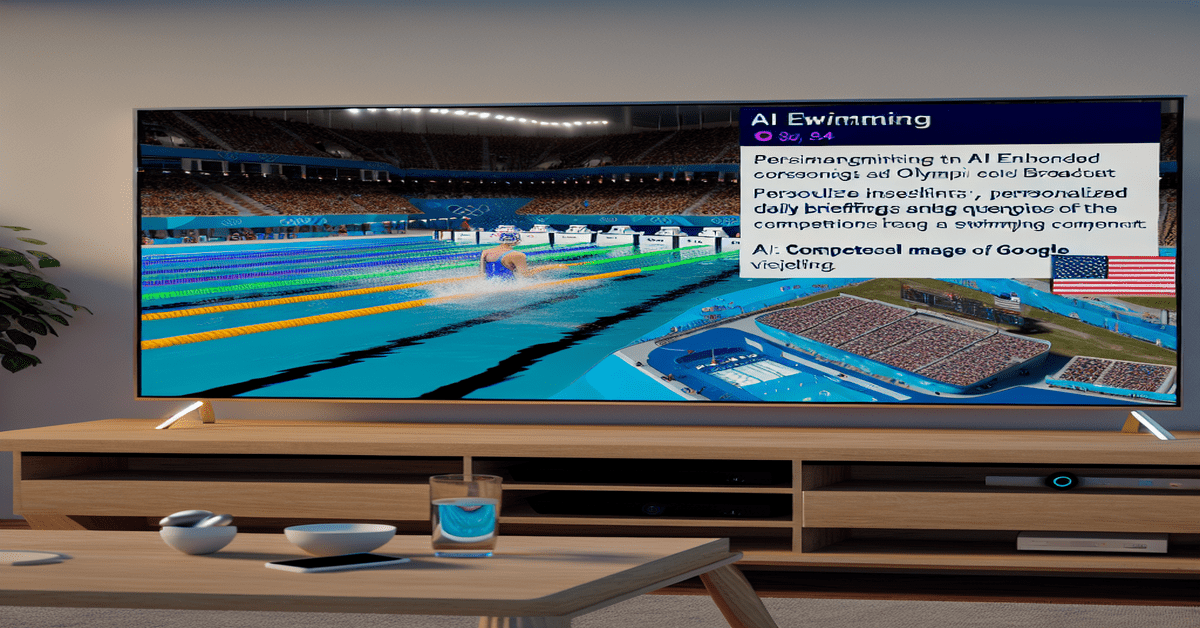The AI Revolution in Olympic Broadcasting: Enhancing Viewer Engagement
The Olympic Games have always been a global spectacle, captivating audiences worldwide with unparalleled displays of athletic prowess and the spirit of international unity. As we approach the highly anticipated Paris Olympics, a new era of broadcasting is set to revolutionize the way viewers experience the games. The integration of artificial intelligence (AI) is poised to transform the Olympic viewing experience, particularly for American audiences.
NBCUniversal, in collaboration with Google and Team USA, is spearheading the charge in AI-enhanced broadcasting for the Paris Olympics. American viewers can expect a range of cutting-edge features that will elevate their engagement and immersion in the Olympic events. One of the most exciting developments is the introduction of AI-enhanced commentary. Through generative AI technology, NBCUniversal will create personalized daily briefings of Olympic events, narrated by an AI recreation of the iconic voice of sports commentator Al Michaels. This innovative approach has the potential to generate nearly seven million variations of daily recaps, tailoring the content to individual viewers’ preferences and interests.
Google’s AI Integration: Insights and Entertainment
Google’s AI technology will play a significant role in enhancing the American viewing experience during the Paris Olympics. Viewers can expect AI-powered insights and answers to their questions about various sports, such as pool-lane assignments in swimming competitions. This real-time information will deepen viewers’ understanding and appreciation of the events as they unfold.
Furthermore, comedian Leslie Jones will leverage Google’s Gemini AI model to learn about new sports and provide entertaining commentary for the audience. This unique blend of AI-assisted learning and comedic storytelling promises to add a fresh and engaging perspective to the Olympic coverage.
Immersive Viewing Experience
To transport viewers to the heart of the action in Paris, NBC will utilize AI-enhanced Google Map images of the Olympic venues. These immersive visuals will allow audiences to virtually explore the iconic locations where the competitions take place, creating a sense of presence and connection to the athletes and the host city.
NBC hosts will also demonstrate how Google AI search can provide valuable competition insights, further enhancing the viewer’s understanding and appreciation of the Olympic events. By harnessing the power of AI, American broadcasters aim to deliver a more engaging, informative, and immersive experience for their audience.
The European Perspective: Cautious Approach to AI Integration
While American viewers will be treated to a plethora of AI-enhanced features during the Paris Olympics, European audiences may experience a different level of AI integration. European broadcasters have expressed concerns about the maturity of AI technology and its ability to convey the emotional impact of intense sports moments.
The reservations surrounding AI integration in European Olympic broadcasts highlight the ongoing debate about the role of technology in sports coverage. Some argue that the human element, with its ability to capture and convey genuine emotions, is crucial to the viewing experience. Others believe that AI can complement and enhance human commentary, providing valuable insights and engaging content.
The Future of Olympic Broadcasting
As we witness the dawn of AI in Olympic broadcasting, it is clear that the landscape of sports media is undergoing a significant transformation. The Paris Olympics will serve as a testing ground for the effectiveness and reception of AI-enhanced features, particularly in the American market.
The success of AI integration in the upcoming Olympics could pave the way for wider adoption in future sporting events. Broadcasters worldwide will closely monitor the American experience, assessing the impact on viewer engagement, satisfaction, and overall viewing figures.
However, the journey towards AI-powered sports broadcasting is not without challenges. Concerns about the authenticity and emotional resonance of AI-generated content must be addressed. Striking the right balance between technological innovation and preserving the human touch will be crucial in shaping the future of Olympic coverage.
Embracing the AI-Powered Olympic Experience
As we eagerly await the Paris Olympics, American viewers have much to look forward to in terms of AI-enhanced broadcasting. The collaboration between NBCUniversal, Google, and Team USA promises to deliver an unparalleled viewing experience, combining personalized content, insightful commentary, and immersive visuals.
While European audiences may take a more cautious approach to AI integration, the Paris Olympics will undoubtedly spark discussions and debates about the role of technology in sports media. As the industry evolves, it is essential for broadcasters to strike a balance between innovation and preserving the emotional core of the Olympic spirit.
The AI revolution in Olympic broadcasting is just beginning, and the Paris games will serve as a crucial milestone in shaping the future of sports media. As viewers, we have the opportunity to embrace this new era of enhanced engagement and immersion, while also appreciating the timeless values of human achievement and global unity that the Olympics represent.
Join the conversation and share your thoughts on the AI-powered Olympic experience. How do you envision the future of sports broadcasting, and what role do you believe AI will play in enhancing viewer engagement? Together, let us celebrate the marvel of human athleticism and the boundless possibilities that technology brings to the world of sports.
#OlympicAI #FutureOfBroadcasting #ParisOlympics #Olympic #AI
- Original article and inspiration provided by Opahl Technologies
- Connect with one of our AI Strategists today at Opahl Technologies


